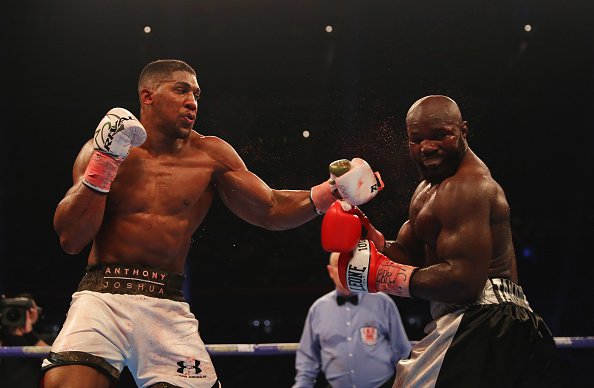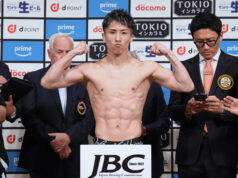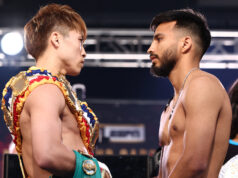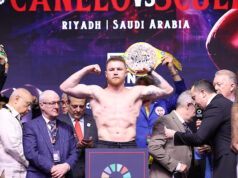By Jimmy Tobin-
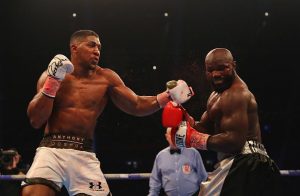
Anthony Joshua retained his heavyweight hardware with a tenth-round stoppage of typically game Carlos Takam at the near-bursting Principality Stadium in Cardiff, Wales Saturday night. A right hand wobbled Takam at a time when he was as much a threat to Joshua’s unblemished knockout streak as Joshua was to Takam’s senses, and referee Phil Edwards, understanding which of the threatened most needed protecting, waived off the action. God save the King!…or at least preserve him.
Joshua rallying from an early knockdown to chop down Wladimir Klitschko six months ago this was not, and the discrepancy between the quality of that fight and expectations for Saturday’s is likely a force-multiplier for any disappointment with Joshua-Takam. Takam would not make any harrowing inquiries of the heavyweight future, for however sturdy, fit, even crafty by modern heavyweight standards he may be, he was still only a replacement for mandatory challenger Kubrat Pulev (who might make a compelling fight against Takam but would meet a similar fate against Joshua).
Yet in an era where a fighter can have developmental fights even after winning multiple titles, and where every stern challenge provides license for at least one unwatchable one, Takam was as good a replacement opponent as you will see. The Cameroonian went ten attritional rounds with the finest version of Alexander Povetkin chemistry could concoct, and it was Takam who first scuffed some of the sheen off Joseph Parker (validating him in the process). Without pressure from a sanctioning body, promoter Eddie Hearn might have tried to get away with a lesser opponent: after all, not one of the 75,000 or so devotees in Principality Stadium bought a ticket to watch Pulev, no one was there to catch an in-person glimpse of Takam. Joshua could have fought most anyone and the crowd would have left happy provided his opponent was riveted to the canvas.
But Takam can, and came to, fight. Joshua looked ponderous at times trying to corner Takam, and betrayed his frustration at this by too often loading up—and subsequently missing—when he was in range. The headbutt that crashed into and broke Joshua’s nose in the second round only compounded his troubles. Still, he dropped Takam in the fourth, cut him over both eyes, and however convenient the stoppage, was never remotely in danger of losing. Joshua should learn from this fight; expect his body punches (something he used to great effect against Klitschko) to figure more prominently in the future, for trainer Robert McCracken to remind Joshua that a 250-pound man with technique and intentions befitting his calling need prioritize landing clean punches—and trust their ensuing effect. And, as there is craft beyond the margins of sportsmanship worth learning, one also expects Joshua to treat the next opponent who repeatedly-accidentally leads with his head to an equally malicious response.
Joshua’s struggles, minimal as they were, serve as a reminder that however uninspiring the opponent, however suspicious the stoppage, Saturday’s fight was no formality. Indeed, finding anything suspicious at all about the stoppage only confirms this—no one would decry a premature ending to a pointless endeavor. Takam pushed Joshua a bit, revealed something of him, and fights that reveal tend to be entertaining. Admittedly, this may stretch the criteria for what constitutes entertainment and were you to pass entirely on watching what appeared very much like a foregone conclusion, you will find no objection here.
But the point about revelation is important: because any expectations that Tyson Fury’s dethroning of Klitschko two years ago would liberate the division, would result in matchups of refreshing novelty and quality, died quickly. The only heavyweight fight of any genuine intrigue since was Joshua-Klitschko, (which was phenomenal). Fury, the supposed liberator, cannot get himself in the ring, Deontay Wilder continues to suffer (benefit?) from drug testing, while Luis Ortiz only suffers from it; all of which speaks to how many of those aforementioned matchups of refreshing novelty have actually been made. (And while we’re at it, how about that bloody process of elimination establishing the cruiserweight pecking order looming as an unforgiving point of comparison?)
Joshua’s future then, promises more Takams than even forty-something-year-old Klitschkos—all the better if the challengers-in-perpetuity can make him sweat. Let them make a complete fighter of him, and confirm this creation with a few thrills along the way.
So Joshua will probably not clean out a division begging for such treatment anytime soon: mandatory defenses and the rest of the stifling rigmarole that keeps boxing forever in its own way will see to that. Should he fight two to three times a year, however, splitting those fights between tedious defenses and the challenges even his critics crave, then the division is in good hands. Oh, it’s mostly still a wreck, photographs of Tyson Fury with his shirt off, gifs of Deontay Wilder, and a handful of drug tests will tell you that. Still, if you find yourself in the food court of a mall streaming a Joshua fight on your phone, know that he is the rare heavyweight that warrants such efforts.


